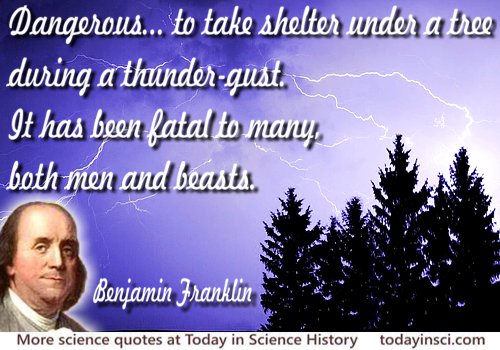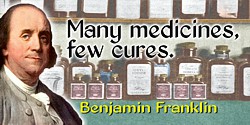 (source)
(source)
|
Benjamin Franklin
(17 Jan 1706 - 17 Apr 1790)
American statesman, scientist, inventor, diplomat, author, printer and publisher known for his electrical experiment, the Franklin stove, bifocal eyeglasses and the lightning rod. Less well know are his efforts establishing public amenities, including a fire company, library, and hospital.
|
Benjamin Franklin Quotes on Electricity (6 quotes)
>> Click for 78 Science Quotes by Benjamin Franklin
>> Click for Benjamin Franklin Quotes on | Diet | Doctor | Experiment | Health | Knowledge | Life | Physician |
>> Click for 78 Science Quotes by Benjamin Franklin
>> Click for Benjamin Franklin Quotes on | Diet | Doctor | Experiment | Health | Knowledge | Life | Physician |
And we daily in our experiments electrise bodies plus or minus, as we think proper. [These terms we may use till your Philosophers give us better.] To electrise plus or minus, no more needs to be known than this, that the parts of the Tube or Sphere, that are rubb’d, do, in the Instant of Friction, attract the Electrical Fire, and therefore take it from the Thin rubbing; the same parts immediately, as the Friction upon them ceases, are disposed to give the fire they have received, to any Body that has less.
— Benjamin Franklin
Letter 25 May 1747. Quoted in I. Bernard Cohen, Franklin and Newton: An Enquiry into Speculative Newtonian Experimental Science and Franklin’s Work in Electricity as an Example Thereof (1956), 439.
Chagrined a little that we have been hitherto able to produce nothing in this way of use to mankind; and the hot weather coming on, when electrical experiments are not so agreeable, it is proposed to put an end to them for this season, somewhat humorously, in a party of pleasure, on the banks of Skuylkil. Spirits, at the same time, are to be fired by a spark sent from side to side through the river, without any other conductor that the water; an experiment which we some time since performed, to the amazement of many. A turkey is to be killed for our dinner by the electrified bottle: when the healths of all the famous electricians in England, Holland, France, and Germany are to be drank in electrified bumpers, under the discharge of guns from the electrical battery.
— Benjamin Franklin
Letter to Peter Collinson, 29 Apr 1749. In I. Bernard Cohen (ed.), Benjamin Franklin's Experiments (1941), 199-200.
Dangerous, therefore, is it to take shelter under a tree, during a thunder-gust. It has been fatal to many, both men and beasts.
— Benjamin Franklin
'Letter IV. Containing Observations and Suppositions towards forming a new Hypothesis, for explaining the several Phænomena of Thunder-Gusts', in Experiments and Observations on Electricity, Made at Philadelphia in America by Mr. Benjamin Franklin, and Commnicated in Several Letters to Mr. P. Collinson, of London, F.R.S. (1751), 47. In the book, the letter is undated, but it is printed after a footnote dated 29 Apr 1749, and is followed by one dated 29 Jul 1750. Therefore, it is assumed by later authors to have been written in summer 1749. When I. Bernard Cohen editted Benjamin Franklin's Experiments (1941), 209, he wrote that the letter was wrtten during summer or autumn of 1749 and “was dispatched, not to Collinson, but to Dr John Mitchel F.R.S." In his later books, Cohen dates it as 29 Apr 1749.
I must own I am much in the dark about light. I am not satisfied with the doctrine that supposes particles of matter, called light … May not all the phenomena of light be more conveniently solved, by supposing universal space filled with a subtle elastic fluid, which, when at rest, is not visible, but whose vibrations affect that fine sense in the eye, as … the ear … in the case of sound … May not different degrees of the vibration of the above-mentioned universal medium occasion the appearances of different colors? I think the electric fluid is always the same; yet I find that weaker and stronger sparks differ in apparent color; some white, blue, purple, red; the strongest, white; weak ones, red.
— Benjamin Franklin
In Letter (23 Apr 1752) to Calwallader Colden, collected in William Duane (ed.), Memoirs of Benjamin Franklin (1834), Vol. 2, 270.
In going on with these Experiments, how many pretty systems do we build, which we soon find ourselves oblig’d to destroy! If there is no other Use discover’d of Electricity, this, however, is something considerable, that it may help to make a vain Man humble.
— Benjamin Franklin
Letter to Peter Collinson, 14 Aug 1747. In I. Bernard Cohen (ed.), Benjamin Franklin’s Experiments (1941), 63.
The electrical matter consists of particles extremely subtile, since it can permeate common matter, even the densest metals, with such ease and freedom as not to receive any perceptible resistance.
If anyone should doubt whether the electrical matter passes through the substance of bodies, or only over along their surfaces, a shock from an electrified large glass jar, taken through his own body, will probably convince him.
Electrical matter differs from common matter in this, that the parts of the latter mutually attract, those of the former mutually repel each other.
If anyone should doubt whether the electrical matter passes through the substance of bodies, or only over along their surfaces, a shock from an electrified large glass jar, taken through his own body, will probably convince him.
Electrical matter differs from common matter in this, that the parts of the latter mutually attract, those of the former mutually repel each other.
— Benjamin Franklin
'Opinions and Conjectures, Concerning the Properties and Effects of the Electrical Matter, arising from Experiments and Observations, made at Philadelphia, 1749.' In I. Bernard Cohen (ed.), Benjamin Franklin's Experiments (1941), 213.
See also:
- 17 Jan - short biography, births, deaths and events on date of Franklin's birth.
- Benjamin Franklin - context of quote “Dangerous... to take shelter under a tree, during a thunder-gust” - Medium image (500 x 350 px)
- Benjamin Franklin - context of quote “Dangerous... to take shelter under a tree, during a thunder-gust” - Large image (800 x 600 px)
- Benjamin Franklin: An American Life, by Walter Isaacson. - book suggestion.
- Booklist for Benjamin Franklin.





 In science it often happens that scientists say, 'You know that's a really good argument; my position is mistaken,' and then they would actually change their minds and you never hear that old view from them again. They really do it. It doesn't happen as often as it should, because scientists are human and change is sometimes painful. But it happens every day. I cannot recall the last time something like that happened in politics or religion.
(1987) --
In science it often happens that scientists say, 'You know that's a really good argument; my position is mistaken,' and then they would actually change their minds and you never hear that old view from them again. They really do it. It doesn't happen as often as it should, because scientists are human and change is sometimes painful. But it happens every day. I cannot recall the last time something like that happened in politics or religion.
(1987) -- 


